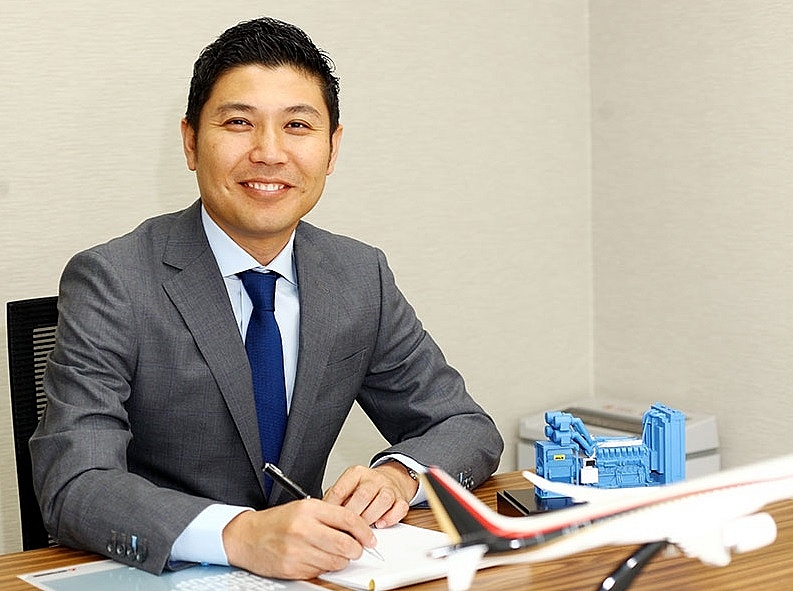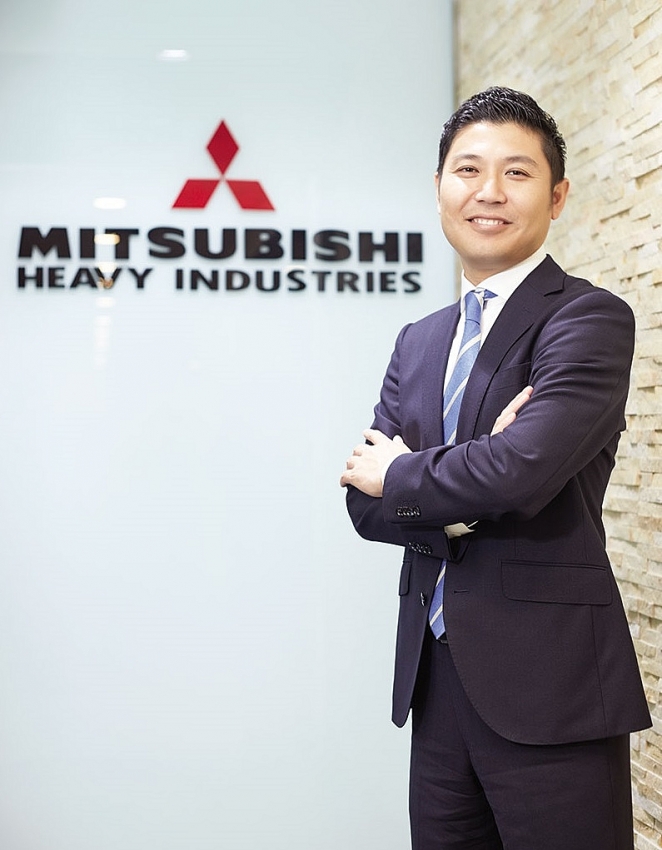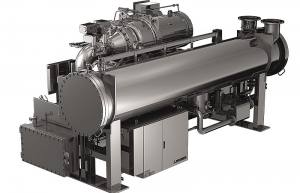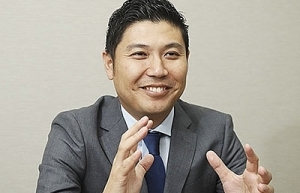MHI looks to power Vietnam’s future
 |
| Jun Shirota |
Please give a brief introduction of Mitsubishi Heavy Industries (MHI) from a global and regional perspective. How important is the Vietnamese market to MHI’s overall business goals?
As a global leader in engineering and manufacturing, MHI Group has been at the forefront of delivering technologies that respond to the specific needs of organisations from various sectors. The group has a significant global footprint, with around 300 companies across several markets.
The Asia Pacific region is MHI Group’s second-biggest market outside of Japan. And in this region, Vietnam is one of our key markets due to its large and very young population as well as its high GDP growth rate. Since our first foray into the Vietnamese market in 1994, MHI Group has established a large footprint in numerous industries in the country.
In Vietnam, MHI Group has representative offices in both Hanoi and Ho Chi Minh City. Our subsidiary companies here in Vietnam include MHI Aerospace Vietnam (MHIVA), which specialises in manufacturing components for commercial aircraft; MHI Engine Systems Vietnam (MHIESV), which is involved in the manufacture, assembly, and sale of diesel generators and its parts; and Mitsubishi Hitachi Power Systems (MHPS), which develops equipment for power plants.
What are the areas of business you are currently focusing on as the general manager of MHI Vietnam?
Since I joined MHI Vietnam in 2016, my main task has been to explore new business opportunities, including those that will allow us to introduce MHI products to the country. As MHI Group has a diverse portfolio of over 500 products, we are constantly analysing market trends and specific industry requirements to propose the best solutions for the local market.
Based on the results of our market research, we developed total package solutions that combine different types of products and services specifically tailored to serve the needs of the local business landscape. Currently, we are focusing on three major areas – factories and industrial parks, urban development, and airports.
For example, over the last few years, Vietnam has become a key manufacturing hub in the region. The country is now home to numerous industrial and export processing zones. To capitalise on this development, MHI Group has created something called a “Total Package Solution” for existing and new industrial parks, which can help improve their operational efficiency.
Meanwhile, factories can reduce costs through the optimisation of energy usage and maximisation of production capacity with state-of-the-art technology like our “Factory Total Package” and “Energy Center”.
Vietnam is experiencing rapid urbanisation. How can MHI support Vietnam as it undergoes profound changes brought about by this development?
 |
| MHI Vietnam’s general manager Jun Shirota seeks to contribute to Vietnam’s continued growth and development |
Many aspects of Vietnamese urban life are changing rapidly, including the way we manage energy, waste, traffic, water distribution, and urban planning. In line with this, MHI Group plans to deliver an urban development total package solution to help Vietnam embrace these changes.
With an emphasis on energy management, we have developed an energy centre solution that controls electricity, heat, steam, and water for buildings and urban areas. This provides numerous benefits to customers, such as reducing energy consumption and improving total energy usage. As the Vietnamese government is promoting the concept of smart cities, we believe this solution can contribute greatly to this concept.
Regarding transportation, MHI supports Vietnam in meeting the growing demand for air travel and better airport infrastructure with our “Airport Total Package” and “Automated Guideway Transit”.
Furthermore, MHI conducted a pilot project for an integrated solution for electronic toll collection in 2015, aimed at creating smoother journeys for Vietnamese drivers. The solution collects toll fees automatically, doing away with the need for cars to line up and stop, and helping reduce traffic jams and even vehicle emissions.
MHI has been engaged in various projects in Vietnam’s power generation sector. What are some its major projects in this field?
Vietnam will need more power plants to meet the growing energy demand and support its economic growth, which opens up opportunities for our cutting-edge equipment for power plants. MHPS is the leading supplier of advanced gas turbines, which can use combined-cycle technology to deliver a record-breaking thermal efficiency greater than 64 per cent.
In Vietnam, the Phu My 1 combined-cycle power plant is one of the power plants that has adopted a combined-cycle gas turbine system provided by MHPS. When it began commercial operations in 2002, Phu My 1 combined-cycle power plant was Vietnam’s largest gas-fueled plant, the output of which accounted for 6 per cent of the country’s installed capacity. The power station has been contributing to the economic development of the area ever since.
MHI Group has also provided solutions and equipment to other projects such as the O Mon thermal power plant and the Thai Binh thermal power plant.
Moving forward, we are looking for new opportunities to collaborate with local energy industry players, looking to contribute to the development of Vietnam’s power generation sector.
What are MHI’s outlook and long-term plans for Vietnam?
We anticipate the continued strong growth of Vietnam’s economy and see many opportunities for us to contribute to its sustainable development. Given that local infrastructure still has room for continued development, Vietnam presents tremendous opportunities for MHI Group to deliver cross-industry solutions – from power generation and aviation to industrial parks.
Furthermore, we are committed to supporting initiatives and bolstering partnerships that will help improve the lives of Vietnam’s population, such as the rise of smart cities and proper urban development. As we see growing demand for air conditioning due to the boom of residential and office buildings, we continue to introduce into the market different types of air conditioning units that use the latest technology, specifically those that offer high-efficiency systems for cooling.
Above all, MHI takes its role as a responsible corporate citizen seriously. As such, we always look for ways to contribute to social development in areas where we operate. In Vietnam, one of our main initiatives is supporting Vietnam’s youth and helping develop local talent. An example of this is our long-term partnership with the Ministry of Education and Training for a scholarship and exchange student programme which provides opportunities for Vietnamese students to study in Japan and receive internships in MHI.
 | MHI rolls out cross-industry solutions Cross-industry solutions will be a key focus for Mitsubishi Heavy Industries Group in their next phase of development in Vietnam. |
 | Vietnam: a cornerstone of MHI Group’s Asia strategy As part of its business strategy in Asia, Mitsubishi Heavy Industries Group (MHI) looks to bring more innovative solutions to Vietnam. Jun Shirota, general manager ... |
What the stars mean:
★ Poor ★ ★ Promising ★★★ Good ★★★★ Very good ★★★★★ Exceptional
Related Contents
Latest News
More News
- State corporations poised to drive 2026 growth (February 03, 2026 | 13:58)
- Why high-tech talent will define Vietnam’s growth (February 02, 2026 | 10:47)
- FMCG resilience amid varying storms (February 02, 2026 | 10:00)
- Customs reforms strengthen business confidence, support trade growth (February 01, 2026 | 08:20)
- Vietnam and US to launch sixth trade negotiation round (January 30, 2026 | 15:19)
- Digital publishing emerges as key growth driver in Vietnam (January 30, 2026 | 10:59)
- EVN signs key contract for Tri An hydropower expansion (January 30, 2026 | 10:57)
- Vietnam to lead trade growth in ASEAN (January 29, 2026 | 15:08)
- Carlsberg Vietnam delivers Lunar New Year support in central region (January 28, 2026 | 17:19)
- TikTok penalised $35,000 in Vietnam for consumer protection violations (January 28, 2026 | 17:15)

 Tag:
Tag:




















 Mobile Version
Mobile Version